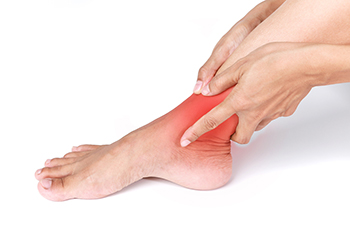Ankle Pain and Rheumatoid Arthritis
Tuesday, 23 May 2023 00:00
Many people are currently living with a condition known as rheumatoid arthritis, or RA, which is an inflammatory disease that attacks the joints. Individuals who have or are developing rheumatoid arthritis often experience certain symptoms that are highly indicative of the condition. For example, the joints in the body may ache, and more specifically, the ankles may be affected. Sometimes, the aching and pain can be symmetrical in the ankles, which means that both of the ankle joints may ache. Importantly, those whose ankles are affected by rheumatoid arthritis may also experience some amount of swelling in the ankle joints. If you think that you have rheumatoid arthritis and your ankles are being affected, it is suggested that you contact a podiatrist today for an appointment.
Ankle pain can be caused by a number of problems and may be potentially serious. If you have ankle pain, consult with John Horlebein, DPM from Northern Cascades Foot & Ankle, LLC. Our doctor will assess your condition and provide you with quality foot and ankle treatment.
Ankle pain is any condition that causes pain in the ankle. Due to the fact that the ankle consists of tendons, muscles, bones, and ligaments, ankle pain can come from a number of different conditions.
Causes
The most common causes of ankle pain include:
- Types of arthritis (rheumatoid, osteoarthritis, and gout)
- Ankle sprains
- Broken ankles
- Achilles tendinitis
- Achilles tendon rupture
- Stress fractures
- Bursitis
- Tarsal tunnel syndrome
- Plantar fasciitis
Symptoms
Symptoms of ankle injury vary based upon the condition. Pain may include general pain and discomfort, swelling, aching, redness, bruising, burning or stabbing sensations, and/or loss of sensation.
Diagnosis
Due to the wide variety of potential causes of ankle pain, podiatrists will utilize a number of different methods to properly diagnose ankle pain. This can include asking for personal and family medical histories and of any recent injuries. Further diagnosis may include sensation tests, a physical examination, and potentially x-rays or other imaging tests.
Treatment
Just as the range of causes varies widely, so do treatments. Some more common treatments are rest, ice packs, keeping pressure off the foot, orthotics and braces, medication for inflammation and pain, and surgery.
If you have any questions, please feel free to contact our office located in Chelan, WA . We offer the newest diagnostic and treatment technologies for all your foot care needs.






